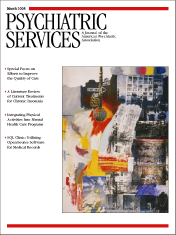Ethical Challenges of Mental Health Clinicians in Rural and Frontier Areas
To the Editor: Rural mental health professionals face many obstacles in delivering an appropriate standard of care to their patients (1). People who live in more remote frontier regions appear to be especially affected by geographic and climatic barriers; shortages of clinicians, facilities, and specialized services; and sociocultural issues in care delivery (1). For these reasons rural care has emerged as a concern in the national discussion of health care disparities (2).
Rural clinicians encounter special ethical challenges, especially in relation to care for stigmatizing illnesses (3,4). These challenges pertain to overlapping personal and professional relationships, confidentiality, balancing patient and community needs, resource limitations, and giving care beyond one's usual scope of clinical competence (3,4). Moreover, it appears that rural clinicians have decreased access to ethics committees and consultants and fewer opportunities for ethics education (5). Finally, professional ethics codes may be ill-attuned to the ethical aspects of rural life, which has a different character from that of resource-enriched, less interdependent urban communities (4).
It is unknown whether mental health clinicians who provide care in frontier areas encounter greater ethical challenges than clinicians in less remote communities. To explore this question we analyzed data collected with a four-page anonymous survey of multidisciplinary mental health clinicians from five rural and frontier counties who were at the doctoral and master's level and attended an ethics educational workshop in eastern Washington State in April 2003.
Fifty-six workshop attendees returned surveys (93 percent response rate). Forty-three respondents (77 percent) were women, and the mean±SD age was 46±10 years. Most (34 respondents, or 61 percent) practiced in rural settings, and the remainder (22 respondents, or 39 percent) practiced in frontier settings. Participants had a mean of 7±.7 years of nonurban practice experience, ranging from less than one year to 30 years. No differences were found between the two groups in the mental health and substance-related caseloads and service activities. Most (38 respondents, or 67 percent) reported having some ethics training in the previous two years. Few (six respondents, or 11 percent) reported that they did not have any previous ethics training. Respondents reported that they were only somewhat prepared to face ethical problems in their practice (mean score of 3.7±.7; possible scores ranged from 1, not at all, to 5, very), and they felt that ethics training tailored to nonurban settings was very important (mean score of 4.5±.7).
We also asked about the frequency of encounters with eight kinds of ethical problems: evaluating professional misconduct, cultural or language barriers, lack of sufficient expertise, informed consent, resource constraints, balancing patient and community needs, overlapping relationships, and confidentiality. All were endorsed with at least moderate frequency across rural and frontier settings (mean scores ranged from 2.33 to 3.91; possible scores ranged from 1, never, to 5, daily). Interestingly, in a practice setting by problem multivariate analysis of variance, a practice setting main effect showed that frontier caregivers reported significantly more ethical problems overall than rural providers (F=15.30, df=1, 45, p<.001). Certain problems were especially frequent among frontier clinicians, such as balancing community and patient needs (Cohen's d=1.16, p≤.001), managing overlapping personal and professional relationships (d=.76, p<.01), obtaining informed consent (d=.79, p<.01), and dealing with professional misconduct by colleagues (d=.72, p<.02).
Many challenges accompany the delivery of mental health care in rural and frontier communities. This modest study suggests that frontier clinicians may face ethical problems more frequently than rural clinicians. This novel finding merits more rigorous investigation. It is our hope that this preliminary work will help ethical considerations in the care of persons with stigmatizing illnesses gain greater prominence as our nation seeks to address disparity issues in rural and frontier America.
Acknowledgments
The authors thank David W. Pachak-Robie, B.B.A, Brian Roberts, M.D., Kristin Edenharder, B.A., and Mark Talatzko for their assistance in the development of this report. This project was supported by grant 1-R01-DA131-39 from the National Institute of Drug Abuse.
Dr. Roberts is professor and chair of the department of psychiatry and behavior medicine at the Medical College of Wisconsin in Milwaukee. Dr. Warner is a research assistant professor and Dr. Hammond is a research scientist with the department of family and community medicine at the University of New Mexico School of Medicine in Albuquerque.
1. Wagenfeld MO, Murray JD, Mohatt DF: Mental Health and Rural America:1980–1993: An Overview and Annotated Bibliography. Rockville, Md, National Institute of Mental Health, Office of Rural Health Policy, Department of Health and Human Services, Public Health Service, 1993Google Scholar
2. Braden J, Beauregard K: Health status and access to care of rural and urban populations. National Medical Expenditure Survey Research Findings 18. Rockville, Md, Agency for Health Care Policy and Research, Public Health Service, 1994Google Scholar
3. National Healthcare Disparities. Rockville, Md, Department of Health and Human Services, Agency for HealthCare Research and Quality, 2003Google Scholar
4. Roberts LW, Battaglia J, Epstein RS: Frontier ethics: mental health care needs and ethical dilemmas in rural communities. Psychiatric Services 50:497–503, 1999Link, Google Scholar
5. Roberts LW, Battaglia J, Smithpeter M, et al: An office on Main Street: health care dilemmas in small communities. Hastings Center Report 29:28–37, 1999Crossref, Medline, Google Scholar



